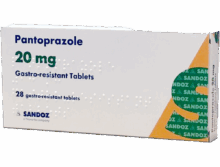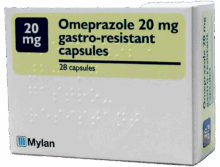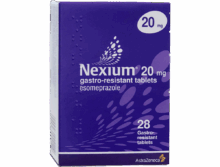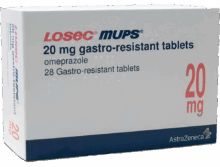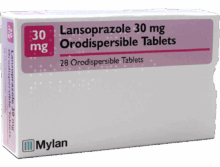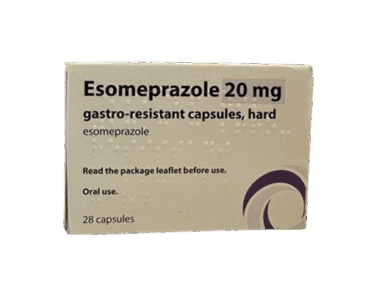
Esomeprazole 20mg/40mg
from
£9.99
Esomeprazole is an acid reflux treatment that helps to reduce the amount of acid produced in the stomach. It is also available as a branded product Nexium. Esomeprazole is usually taken once a day in the morning.
Esomeprazole 20mg/40mg
Buy Esomeprazole
Buy acid reflux medicine online today from our trusted UK pharmacy. Select either 14-day or 28-day tablets, available in esomeprazole 20 mg and esomeprazole 40 mg dosages.
Esomeprazole Prices
| Name & Dosage | x14 Capsules | x28 Capsules |
|---|---|---|
| Esomeprazole 20mg Capsules | £9.99 | £15.99 |
| Esomeprazole 40mg Capsules | £14.99 | £17.99 |
Summary for Esomeprazole
| Medication Class | Proton pump inhibitors (PPIs) |
|---|---|
| Mechanism of action | Inhibits the proton pump in the stomach lining |
| Active ingredient | Esomeprazole Magnesium Dihydrate |
| Strength | 20mg, 40mg |
| Effective within | Starts to work within 2 to 3 days |
| Dosage Instructions | Once daily |
| Manufacturer | Balkanpharma Dupnitsa AD |
| Use with alcohol | Yes, but stomach may produce more acid than normal |
About Esomeprazole
Key Points
- This medicine targets symptoms of acid reflux, heartburn and indigestion
- It works to reduce acid production in stomach
- Taken once a day before breakfast
What is Esomeprazole Used For?
Esomeprazole is a medicine used to treat acid reflux, heartburn and indigestion or to prevent stomach ulcers. It is sometimes taken for a rare condition called Zollinger-Ellison syndrome.
Esomeprazole belongs to a drug class called proton pump inhibitors. It is also available as a branded product called Nexium. The full name of the drug is esomeprazole magnesium.
How Does Esomeprazole Work?
Esomeprazole acid reflux tablets work by blocking the action of the proton pump in the stomach. This means that your stomach produces less acid, which is what causes a burning feeling in the chest, or regurgitation when it backs up into the oesophagus.
Esomeprazole Dosage Instructions
The dose of esomeprazole used to treat acid reflux is 20mg once daily. You may take esomeprazole long term if you have chronic acid reflux, however, you will require a prescription from your doctor.
Please note: You should not take esomeprazole for more than 14 days unless your doctor has advised you to. If your symptoms do not improve or get worse, you should speak to your doctor as you may need to have tests carried out, such as a gastroscopy.
How Do You Take Esomeprazole?
You should take one tablet around 30-60 minutes before breakfast. The best time to take esomeprazole is in the morning. You should sit upright when taking a tablet and swallow it whole with a glass of water. If you are unable to swallow tablets, you can crush the tablet and dissolve it in water.
What Should I Do If I Miss a Dose?
If you miss a dose of esomeprazole, you should take a tablet as soon as you remember. If it is close to the time of your next dose, skip the missed dose and go back to your normal regimen. Do not take 2 doses at the same time or extra doses to make up for the missed dose.
How Long Does Esomeprazole Take to Work?
It can take around 2-3 days for the effects of esomeprazole to kick in. However, you should give it around a month for the full effect to be seen. If you do not feel better after 14 days, you should see your doctor.
Esomeprazole Warnings
You must not take esomeprazole tablets if you are:
- Allergic to esomeprazole or any of the other ingredients of this medicine
- Allergic to other proton pump inhibitor medicines, such as pantoprazole, lansoprazole, rabeprazole, omeprazole
- Taking medicine containing nelfinavir (used to treat HIV infection)
If you’re unsure if any of these apply to you, it’s important that you seek advice from your doctor or pharmacist before taking this medicine.
When Should I See My Doctor?
You should see your doctor if:
- You develop signs of an allergic reaction such as hives, red, swollen, peeling skin with or without fever, wheezing, tightness in the chest
- You experience any unwanted side effects
- You have heartburn most days or you do not feel better after 14 days
- You experience unwanted weight loss
- You have other alarming symptoms like being sick, food getting stuck in your throat, blood in your stool, and bad stomach pain
- You have severe or persistent diarrhoea; esomeprazole has been associated with a small increased risk of infectious diarrhoea
- If you get a rash on your skin, especially in areas exposed to the sun, tell your doctor as soon as you can, as you may need to stop your treatment with esomeprazole tablets
- Any other ill-effects like pain in your joints
- You have osteoporosis or if you are taking corticosteroids (which can increase the risk of osteoporosis)
Esomeprazole Interactions
Can I Take Esomeprazole with Other Medications?
Esomeprazole is safe to take with most medication. It can affect the way some medicines work, and some medicines can alter the way in which esomeprazole tablets work.
If you are taking any of the following, you should consult your doctor first before taking esomeprazole:
- HIV medication
- Blood clot medication
- Medication to treat infections caused by fungus
- Cancer medication
- Depression medication
- Epilepsy and anxiety medication
- Blood thinning medicines
- Intermittent claudication medicine
- Indigestion and heartburn medicine
- Medicines for heart problems
- Chemotherapy medicine
- Organ transplantation medication
- Treatment for tuberculosis
- St John’s wort
Please note: You must not take esomeprazole if you are taking medicine used to treat HIV containing nelfinavir.
If you’ve been prescribed antibiotics amoxicillin and clarithromycin as well as esomeprazole to treat ulcers caused by Helicobacter pylori infection, it is very important that you tell your doctor about any other medicines you are taking.
Can I Take Esomeprazole and Buscopan Together?
Esomeprazole is a proton pump inhibitor (PPI) that reduces stomach acid production, treating conditions such as gastroesophageal reflux disease (GERD) and ulcers, while Buscopan is an antispasmodic which relieves abdominal pain and discomfort in the intestines, stomach and urinary tract. The two medications work in different ways and for different conditions therefore they can typically be taken together, however, you should always seek advice directly from your GP or pharmacist before combining different medications.
Esomeprazole Alternatives
Esomeprazole vs Omeprazole
- Esomeprazole is a more refined version of omeprazole that contains only the active isomer and is thought to provide a more sustained acid suppression.
- Omeprazole tends to be used as a first-line treatment, an effective alternative to esomeprazole in treating GERD, peptic ulcers, and Zollinger-Ellison syndrome.
- Esomeprazole is effective in treating severe gastroesophageal reflux disease (GERD) and erosive esophagitis, due to its ability to maintain higher levels of acid suppression over time
- Esomeprazole is generally more expensive than omeprazole
Esomeprazole vs Lansoprazole
- Both proton pump inhibitors (PPIs) used to reduce stomach acid production
- Esomeprazole generally has a longer half-life than Lansoprazole, meaning it stays in the system longer.
- Both medicines are effective in treating acid-related conditions with similar side effects
- Response to treatment, side effects and interactions should be considered when choosing between the two medicines
Preventions
When stomach acid flows back up into the esophagus it causes acid reflux. You can prevent this by making lifestyle changes, including:
- Cutting out food triggers – fatty, fried or spicy foods, citrus fruits, tomatoes, chocolate, garlic, onions, caffeine, alcohol, and mint
- Eat well – choose smaller, more frequent meals, chew food slowly and eat at least 1-2 hours before you lie down. Do not lie down or recline immediately after eating to prevent acid from moving back up into the esophagus
- Exercise – excess weight puts pressure on the stomach and lower esophageal sphincter (LES)
- Quit smoking – it weakens the LES and increases acid production in the stomach
- Manage stress levels – reflux symptoms can worsen because of stressors
Esomeprazole Ingredients
Active ingredient: Esomeprazole magnesium dihydrate
Inactive ingredients: Methacrylic acid-ethyl acrylate copolymer (1:1), talc, triethyl citrate, hypromellose, sugar spheres, magnesium stearate, hydroxypropyl cellulose, glycerol monostearate 40-55, polysorbate 80, microcrystalline cellulose, povidone, macrogol 6000, crospovidone, sodium stearyl fumarate
Esomeprazole Dosage Instructions
The dose of esomeprazole used to treat acid reflux is 20mg once daily. You may take esomeprazole long term if you have chronic acid reflux, however, you will require a prescription from your doctor.
Please note: You should not take esomeprazole for more than 14 days unless your doctor has advised you to. If your symptoms do not improve or get worse, you should speak to your doctor as you may need to have tests carried out, such as a gastroscopy.
Esomeprazole Side Effects
Seek urgent medical advice and stop taking esomeprazole immediately if experience any of the following serious side effects, which may affect up to 1 in 1000 people:
- Wheezing suddenly
- Lip, tongue, throat or body swelling
- Rash
- Fainting
- Difficulties swallowing (severe allergic reaction)
- Red skin with blisters or peeling. It may also be severe in the lips, eyes, mouth, nose and genitals. This could be ‘erythema multiforme’, ‘Stevens-Johnson syndrome’ or ‘toxic epidermal necrolysis’.
- Signs of liver problems including yellow skin, dark urine and tiredness
Common Side Effects (up to 1 in 10 people affected):
- Headache
- Diarrhoea
- Stomach pain
- Constipation
- The need to pass gas (flatulence)
- Feeling sick or being sick
- Benign polyps in the stomach (change in bowel habits)
Uncommon Side Effects (may affect up to 1 in 100 people):
- Swollen feet and ankles
- Problems sleeping (insomnia)
- Dizziness
- Tingling such as “pins and needles”
- Feeling tired
- Feeling like you’re spinning (vertigo)
- Dry mouth
- Changes in blood tests for your liver
- Skin or lumpy rash (hives) and skin that feel itchy
- Fracture of the hip, wrist or spine (if esomeprazole is used in high doses and over long duration)
Esomeprazole Warnings
You must not take esomeprazole tablets if you are:
- Allergic to esomeprazole or any of the other ingredients of this medicine
- Allergic to other proton pump inhibitor medicines, such as pantoprazole, lansoprazole, rabeprazole, omeprazole
- Taking medicine containing nelfinavir (used to treat HIV infection)
If you’re unsure if any of these apply to you, it’s important that you seek advice from your doctor or pharmacist before taking this medicine.
When Should I See My Doctor?
You should see your doctor if:
- You develop signs of an allergic reaction such as hives, red, swollen, peeling skin with or without fever, wheezing, tightness in the chest
- You experience any unwanted side effects
- You have heartburn most days or you do not feel better after 14 days
- You experience unwanted weight loss
- You have other alarming symptoms like being sick, food getting stuck in your throat, blood in your stool, and bad stomach pain
- You have severe or persistent diarrhoea; esomeprazole has been associated with a small increased risk of infectious diarrhoea
- If you get a rash on your skin, especially in areas exposed to the sun, tell your doctor as soon as you can, as you may need to stop your treatment with esomeprazole tablets
- Any other ill-effects like pain in your joints
- You have osteoporosis or if you are taking corticosteroids (which can increase the risk of osteoporosis)
Esomeprazole Interactions
Can I Take Esomeprazole with Other Medications?
Esomeprazole is safe to take with most medication. It can affect the way some medicines work, and some medicines can alter the way in which esomeprazole tablets work.
If you are taking any of the following, you should consult your doctor first before taking esomeprazole:
- HIV medication
- Blood clot medication
- Medication to treat infections caused by fungus
- Cancer medication
- Depression medication
- Epilepsy and anxiety medication
- Blood thinning medicines
- Intermittent claudication medicine
- Indigestion and heartburn medicine
- Medicines for heart problems
- Chemotherapy medicine
- Organ transplantation medication
- Treatment for tuberculosis
- St John’s wort
Esomeprazole is a proton pump inhibitor (PPI) that reduces stomach acid production, treating conditions such as gastroesophageal reflux disease (GERD) and ulcers, while Buscopan is an antispasmodic which relieves abdominal pain and discomfort in the intestines, stomach and urinary tract. The two medications work in different ways and for different conditions therefore they can typically be taken together, however, you should always seek advice directly from your GP or pharmacist before combining different medications.
Please note: You must not take esomeprazole if you are taking medicine used to treat HIV containing nelfinavir.
If you’ve been prescribed antibiotics amoxicillin and clarithromycin as well as esomeprazole to treat ulcers caused by Helicobacter pylori infection, it is very important that you tell your doctor about any other medicines you are taking.
Esomeprazole and Pregnancy/Breastfeeding
Speak to your doctor or pharmacist before taking esomeprazole if you are pregnant or expecting to be pregnant. There is limited information on its use during pregnancy. Your doctor will decide whether you can take this medicine during this time or recommend a suitable alternative.
Do not take esomeprazole tablets if you are breast-feeding because it is unclear if esomeprazole passes into breast milk.
For more information about esomeprazole acid reflux treatment, take a look at the patient information leaflets below:
Frequently Asked Questions
Generally, this is dependent on multiple factors such as your medical condition i.e type and severity, any underlying conditions, response to the medication, potential side effects and cost. They are all proton pump inhibitors (PPIs) effective in treating acid reflux.
The best over the counter stomach medicine is highly dependent on what type of stomach pain, whether it be acid indigestion and heartburn, acid reflux, gas and bloating, cramps, diarrhoea or bloating. Proton pump inhibitors (PPIs) are effective for frequent heartburn, antacid medication tends to work well for acid indigestion and heartburn and H2 receptor blockers are effective in treating acid reflux. Start our simple online consultation today and get suitability tested by our UK-based clinicians.
There is not much difference between esomeprazole and omeprazole in terms of how well they work. The only minor difference is in their chemical makeup.
Product Reviews
product rated 5/5
Did the job of reducing my heartburn quickly.
By Alison S (via TrustPilot)Superintendent Pharmacist
Written by Chemist Click
First created 17th April 2025
Last reviewed 9th December 2025
Other options include:

Our Awards & Certifications
Our team of experienced pharmacists and healthcare professionals are dedicated to providing the highest level of care and service to every customer, ensuring that they receive the best possible healthcare experience.

Our Clients Say:
Constantly good service, always very quick to deliver items.
By Phil ElliottHighly recommend. Fast delivery. Reliable.
By Carlene GraceHad a great experience, right from consultation to med delivery it was very efficient and professional. Thanks.
By Shefali PathakEasy to navigate website, regularly use their service, prompt timely delivery, discounts for regular customers could be considered.
By ArunI shopped around before purchasing and items price was good. Delivery was prompt and P+P reasonable. Item was as described. Good service.
By Mark LockettGood website, intuitive with great information. Efficient, from payment through to delivery, and good communication updates all the way.
By Graeme WalkerExcellent service. I ordered some meds which was dispatched very quickly and arrived super fast. The meds has a very long expiry date. I would definitely order again. Many thanks.
By Ian TBest company there is for me. Great service and excellent quality plus pricing is perfect. I wouldn't want to use anyone else in all honesty. I have recommended this company to all my friends. It's a tricky subject for us older guys but this company makes it all respectful and they discretion is very much appreciated by us all.
By Mr FranklinLatest articles...

Use our free weight loss calculator to see your results in percentages and track your progress accurately. This guide explains what counts as real results, safe ways to lose weight and points you to useful resources to support your journey.
Read the article
